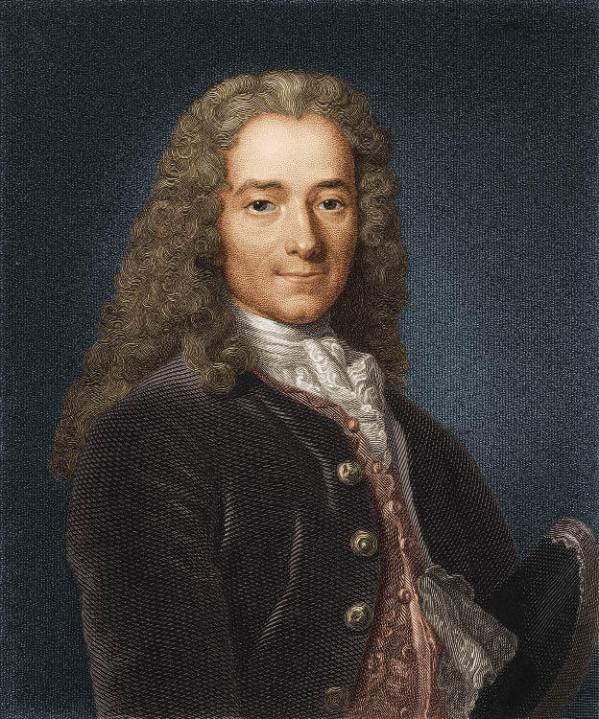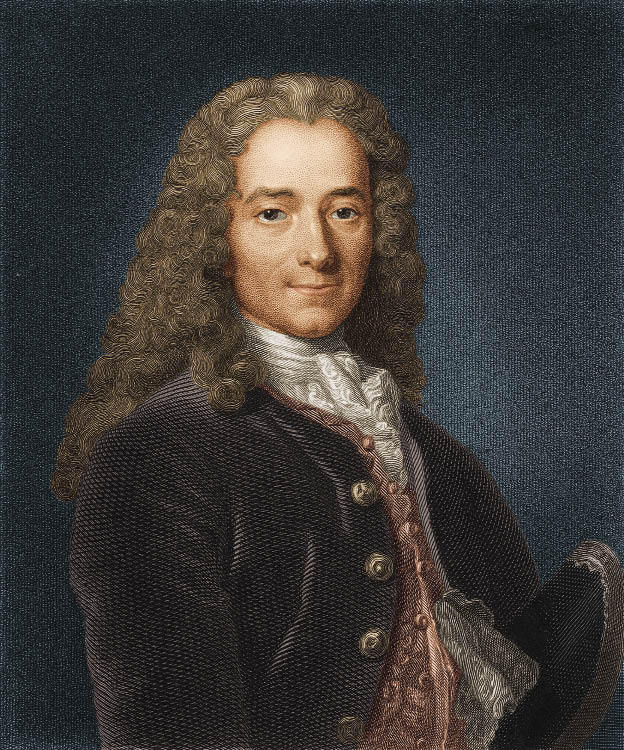Voltaire’s was a long and amazing life.
Voltaire’s was a long and amazing life. He was tragedian, satirist, mathematician, courtier, exile, jailbird, swindler, gardener, plutocrat, watchmaking entrepreneur, penal reform campaigner, celebrity, provocateur, useless loan-shark, serial feuder, coward, astronaut, niece-shagger, spy . . . Except ‘astronaut’, obviously. I made that up to check you were still paying attention. But he did shack up with his niece, the filthy old goat.
It seems a shame, then, that for most of us nowadays that long and amazing life is compressed into a couple of quotes from Candide and a few apocryphal stories about his table talk. Ian Davidson’s biography is the corrective: here’s the great man in the round.
Voltaire was, above all else, one of the world’s great kickers-against-the-pricks — though for much of his career it seemed to be recklessness rather than fearlessness that got him in trouble with said pricks. He just couldn’t help himself. As a young man, for instance, he decided that a poem accusing the regent of sleeping with his own daughter and scheming to usurp the crown would be the thing to cut a dash. He was slung in the Bastille. Did he learn? Apparently not. His party piece not long after was a long bawdy poem about Joan of Arc — making a sort of Eskimo Nell of the French national mascot.
Those were just the jokes. His books — many published anonymously and/or abroad — seemed calculated to embarrass and enrage the French establishment at every turn. And his private remarks had a way of getting out. Like a starlet perpetually leaving sex tapes out where the builders can find them, Voltaire seemed incapable of keeping his rude poems somewhere sensible like a locked desk. Again and again, houseguests stole or copied them, they started to circulate at court, and the round of denial, bluster and recrimination had to begin again. He could have had T-shirts printed up that read: ‘What — me?’
‘People keep saying it is by me, but I have nothing to do with it,’ he protested, in his seventies, of the Dictionnaire Philosophique. The French Prime Minister’s reaction was about typical: ‘Why in the devil’s name are you agitating so much, you Swiss marmot? You will never persuade me that it is not by you.’
He annoyed the Catholics in France and the Calvinists in Geneva. He sucked up to Madame de Pompadour and annoyed Queen Marie. He sucked up to the King of Prussia, and annoyed the ancien régime back home — something he tried to finesse with a hilariously inept foray into espionage (he kept forgetting to use the secret code, and Frederick appears to have rumbled him from the off).
Voltaire was in and out of favour (and exile) throughout his life, and according to Thomas Gray would have been ‘hanged for forging banknotes’ if he’d stayed any longer in England. For much of his career, his signature manoeuvre was what Kelvin MacKenzie dubbed ‘reverse ferret’.
But then — and talk about a late burst of speed — in his seventies he became a fierce campaigner for human rights and against miscarriages of justice. He really did stand his ground, and nobody was better equipped. His directness of thought and expression are still box-fresh.
When one of his books was (again) burned, Voltaire wrote:
If the book was dangerous, it should have been refuted. To burn a book of argument is to say: ‘We do not have enough wit to reply to it.’
That needs no adapting. Nor does another passing observation:
Every village judge would like to be a despot. The madness of domination is an incurable sickness..
He was also funny. The glorious understatement of ‘pour encourager les autres’ shows how, like all great satirists, his worldview was anchored by an irrepressible sense of the absurd. Pigalle came to sculpt him, and he wrote:
When the people of my village saw Pigalle setting out some of the instruments of his craft, they said, ‘Hey, look, he’s going to cut him open; this will be fun’. It is thus, Madame, as you know, that men are amused by any spectacle. It is for the same reason that people go to the marionettes, to the comic opera, to High Mass, to a burial. My statue will make some philosophers smile.
But his broadsides sound salty even now. Protesting against the execution of a young man on trumped-up blasphemy charges, Voltaire wrote:
You could not believe, Sir, how much this event makes our Roman Catholic religion hateful to all foreigners. The judges say that politics forced them to act in this way. What imbecile and barbarous politics!
And how about this, from the entry on ‘Tolerance’ in his Dictionnaire philosophique:
If we really look closely, the Catholic religion, apostolic and Roman is, in all its ceremonies and all its doctrines, the opposite of the religion of Jesus.
That’s brave.
One of the things that Davidson brings out very well here is how threatening Voltaire was to the establishment because his central concerns — free speech and pluralism — were the exact opposite of those that sustained the regime. When campaigning over miscarriages of justice, he consciously appealed not to individuals of influence (though he did that too, for all it was worth) but to a wider public. He clocked that publicity can be a weapon against power.
Davidson cautions, though, that while Voltaire appears to us the paragon of the European enlightenment, this wasn’t how he appeared to himself. It wasn’t the plan. For most of his career Voltaire was a professional writer concerned to line his pockets and burnish his reputation. He didn’t see himself as part of an intellectual movement — indeed, he imagined the golden age of French letters to have been in the previous century.
He came across the young Rousseau and the young Diderot, but neither made much of an impression on him — the younger writers he patronised, now forgotten, were of a far more conventional stripe. Later in life he feuded with Rousseau, and though he did get involved in the Encyclopédie, he did so relatively late on. Davidson also reminds us that for all his anticlericalism, Voltaire was certainly not an atheist.
Davidson is a fastidious debunker of myths and restorer of balance. He tells his story from beginning to end, one year after the next, with an elegant lucidity, and you learn all you need to know about Voltaire’s finances, his domestic arrangements and his social life in readable and intelligent form.
Is it unkind, though, to say that one does miss the sort of zing you see in the quotations? Voltaire was incendiary. One longs for this unimpeachably thorough book, answeringly, to catch fire.








Comments